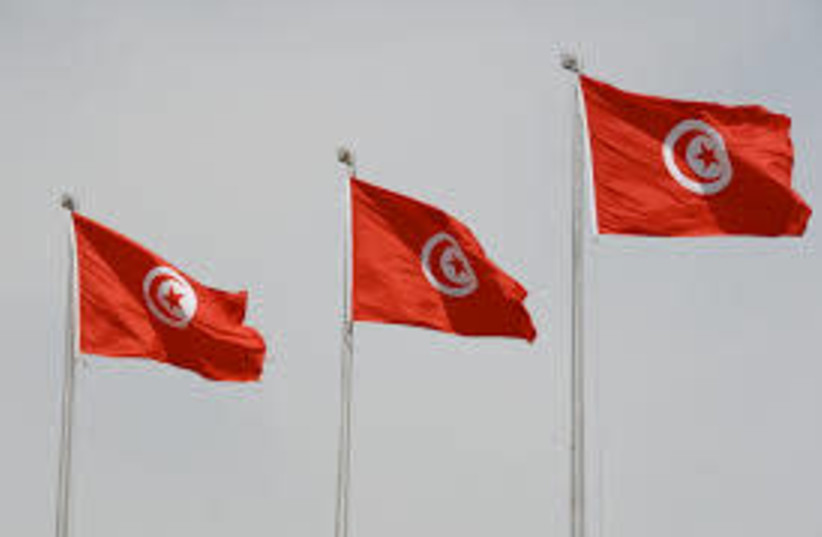
Tunisia’s young democratic rule is feeling the pressure of a presidential-prime minister clash that is exacerbated by the country’s lack of a constitutional court.
For more stories from The Media Line go to themedialine.org
Prime Minister Hichem Mechichi this week dismissed five cabinet ministers who are close to President Kais Saied. Meanwhile, Saied, a constitutional scholar by training, has refused to swear in 11 prospective ministers who passed a vote of confidence in parliament last month, accusing them of involvement in crooked dealings.
The dismissed cabinet members were Justice Minister Mohamed Boussetta; Agriculture Minister Akissa Bahri; State Domains and Land Affairs Minister Leïla Jaffel; Industry, Energy and Mines Minister Salwa al-Saghir; and Youth, Sports and Professional Integration Minister Kamal Daqish.
While the Foreign and Defense ministries fall under the purview of the president, the prime minister oversees all other ministries.
Dr. Radwan Masmoudi, president of the Center for the Study of Islam and Democracy in Tunis, said there is no evidence to prove corruption, only unsupported allegations of “conflicts of interest” against four of the nominees.
“If President Kais Saied has evidence of corruption, he should turn it over to the judicial system, and not behave as if he is the president and also a judge,” Masmoudi told The Media Line.
Mechichi actions come after he last month sacked Interior Minister Taoufik Charfeddine, a close ally of the president who held a senior position in his electoral campaign.
“On the one hand, the president’s act of refusing to swear in five cabinet members approved by the parliament emphasizes Saied’s public attempt to exert his role as the ultimate constitutional arbiter, given his background as a constitutional scholar and his electoral campaign promise of emphasizing accountability in public service,” Arnaud Kurze, a professor of justice studies at Montclair State University in New Jersey and a global fellow at the Wilson Center in Washington, told The Media Line.
“It is, however, also a very political move. … The head of state thus uses his legal knowledge and power to push his agenda,” Kurze continued.
Masmoudi says the prime minister’s cabinet reshuffle is legal under Section 92 of Tunisia’s constitution, which, translated from the French, says the head of government is responsible for: “Dismissing and accepting the resignation(s) of one or more members of the government, after consultation with the President of the Republic in the case of the Ministers of Foreign Affairs and Defense.”
Still, Masmoudi believes Saied’s actions push the boundaries of the constitution and exploit the fact that there is no legal body to decide constitutional disputes.
“I think he was wrong in doing that because the constitution clearly states that once approved by the parliament… they must swear the oath of office in front of the president, who really does not have the right to deny them, or the government, their appointment or the oath of office,” he told The Media Line.
“If we had a constitutional court, it would be its role to clarify these points, but President Kais Saied is taking advantage of the nonexistence of this court to this day to interpret and twist the constitution in a way that gives him veto power over any cabinet appointment,” Masmoudi added.
Sarah Yerkes, a senior fellow in the Carnegie Endowment for International Peace’s Middle East Program who specializes in Tunisia’s politics and economy, said that while it is challenging to decide who is right absent a Supreme Court-like institution, “If parliament approved the [cabinet ministers], even if they are under investigation for corruption, Saied cannot unilaterally decide he doesn’t like them.
“If they are convicted, that is likely another story, but again, the constitutional court would likely need to weigh in,” she told The Media Line.
The battle between prime minister and president is yet another challenge to the sole democracy to emerge from the protests commencing in 2010 known as the Arab Spring.
“It is not a good sign for Tunisia’s democracy. It really highlights the need for a constitutional court, whose creation has been held up by the parliament for years,” Yerkes said.
“Without a legal body to sort out who is right, crucial matters like the naming of ministers have devolved into political infighting and chaos, preventing the country from moving forward,” she continued.
“Especially during times of crisis like [the coronavirus pandemic], the government needs stability and continuity to do its work. This constant reshuffling of cabinet members is really dangerous,” Yerkes added, noting that Tunisia has had four governments in a little over 12 months.
Kurze agrees:
“Tunisia’s [trade] union has called for caution, condemning the current situation, as a political stalemate could potentially fuel further tensions and aggravate the already precarious situation in the country,” he said, in reference to the coronavirus’ financial impact and demonstrations by young people in urban centers feeling the economic squeeze.
“It also distracts from Tunisia’s real problems,” Kurze said.
Related posts:
Supreme Court of Pakistan grants bail to 3 Pakistani Christians charged with ‘blasphemy’
CopBlocker Records in Court Lobby Despite Threats from Armed Goon
Hungarian Mayor: Europe Faces “Bloody Conflict”
Israel Demands World Internet Censorship
Syria Constitutional Committee 'on hold' after three members test positive for the coronavirus
WOA Calls For Athletes To Be Fitted With Microchips
Views: 0
 RSS Feed
RSS Feed

















 February 19th, 2021
February 19th, 2021  Awake Goy
Awake Goy  Posted in
Posted in  Tags:
Tags: 
















